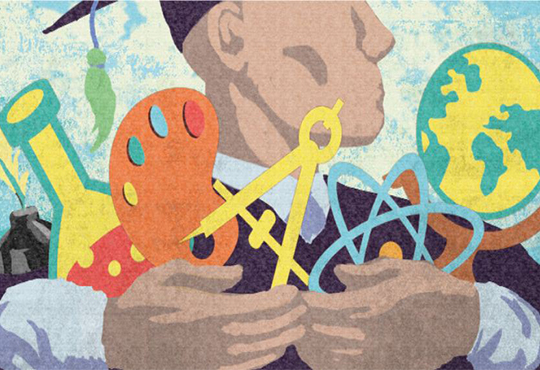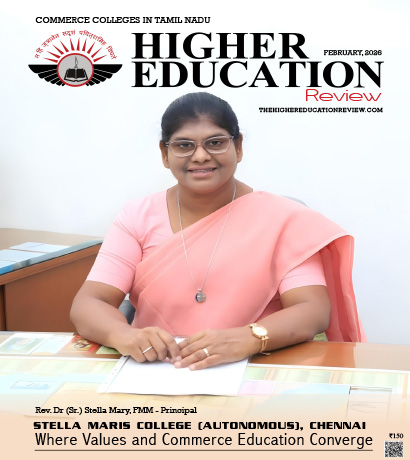Can India Aim to Deliver a World-Class Higher Education System?

Currently working as Principal at Government Engineering College, Kerala, Dr. Ciza Thomas holds experience of more than 25 years in education field. She holds B.Tech & M.Tech degrees from College of Engineering, Trivandrum and Ph.D from Indian Institute of Science, Bangalore. She has been awarded the Appreciation Award in 2010 by the Higher Education Department, Government of Kerala, for implementing Kbase project for all Government Engineering Colleges and Polytechnics in the State of Kerala.
fIndia has the world's third largest higher education system after the US and China. Almost 70 million people have their graduation from around 800 Universities in India, which include AIIMS, IIMs, IITs, IISc, IIEST, IISERs, NITs, and around 40,000 - degree Colleges. Some of these Colleges are autonomous and some affiliated to Universities. Distance learning and open education are also popular in the Indian higher education system with approximately 3.5 million students across the globe. This is an impressive growth of higher education in terms of numbers, but the Indian higher education system still lags behind the standards of the Western and European countries. In the QS World University Rankings every year it is only one or two Indian institutes that make it to the top 200, while just 10 are included in the top 700. Almost two-thirds of our Universities and 90 percent of our Colleges are rated as below average on quality parameters. Industries cite skill shortage as one of the major factors contributing to the increase in unemployed graduates.
"The inter-disciplinary educational approach helps students to broaden their disciplinary perspective which, in the future will enhance their compatibility for better job opportunities"
There are some challenges that are identified in imparting higher education in India to stand at par with the developed countries:
Unfulfilled Expectations from Educational Institutions: Higher education enables students to reach their fullest potentials by providing them knowledge, competence, wisdom, and personality. This happens only when the curriculum keeps pace with time, faculty being highly qualified and talented, and with state-of-the-art infrastructure.
Role of Faculty: Educational institutes have faculty as its true competitive edge, but with limited powers, and hence are generally passive contributors. Students are active contributors and are rewarded for their performance and accomplishments. Hence, in the instructional process, the teachers need to discuss with the students what constitutes a valuable experience for them. This helps in identifying better ways of imparting education to the students. Better qualified faculty helps to develop innovative mechanisms in pedagogy, assuming that their doctoral or higher degrees would help the students to learn from faculty, beyond what is available in textbooks.
Role of Administrators: Quality in higher education is actually based on its management systems. Faculty and staff working in the system cannot do better than what the system allows. The administration must create and nurture a conducive environment for learning to happen and also strive for continual improvements.
Effect of Politics: For an education system to be effective, it should be autonomous and free from politics. However, the higher education in India is subject to heavy government involvement and political pressures on the administration. This results in student activism and political organization of academic staff on campuses. There are also complaints of favoritism and corruption.
Unskilled students: It is true that a generation that understands quality and remains equipped to improve it promises great influence in the progress of society. However, it is a common complaint that the majority of the Universities in India are not preparing the students with enough skills for employment. India has entered the global employment marketplace in the last decade with an acute shortage of quality institutions of higher education.
The Dearth of International Students: Even though India is a leading source of international students around the world with more than 200,000 Indian students studying abroad, our Universities are not able to attract International students. Indian students who study abroad mostly enroll in master's programs with engineering focus that provide them opportunities to enhance career potential. Now, in order to attract international students to study in Indian Universities, the reputation of our Universities have to improve.
Lack of Inter-Disciplinary Studies: Even now, the Indian Universities work as watertight compartments in terms of discipline where very rarely does the inter-disciplinary educational approach come into play. The inter-disciplinary educational approach helps students to broaden their disciplinary perspective which, in the future will enhance their compatibility for better job opportunities.
Deviating from Academic Calendar: Failure in following the academic calendar is an issue in Indian higher education. There are slippages in schedules so much so that, classes in the time table are not held and results are often declared with a time delay of up to one year in several Universities. This lack of accountability is mainly due to our system that does not reward performance or penalize non-performance.
Thus it can be concluded that the Indian higher education is in need of drastic reforms. It is necessary to critically access both academic and administrative features in order to improve the quality of higher education. The academic aspects include institutional vision, mission, goals, and objectives, curriculum, course outcomes, research, patents, and publications. The administrative aspects that are to be accessed include the management structure, infrastructure, finances, student feedback, supporting services, and counseling. Introducing perfection into these features need to be the first step towards achieving world-class higher education in India.
fIndia has the world's third largest higher education system after the US and China. Almost 70 million people have their graduation from around 800 Universities in India, which include AIIMS, IIMs, IITs, IISc, IIEST, IISERs, NITs, and around 40,000 - degree Colleges. Some of these Colleges are autonomous and some affiliated to Universities. Distance learning and open education are also popular in the Indian higher education system with approximately 3.5 million students across the globe. This is an impressive growth of higher education in terms of numbers, but the Indian higher education system still lags behind the standards of the Western and European countries. In the QS World University Rankings every year it is only one or two Indian institutes that make it to the top 200, while just 10 are included in the top 700. Almost two-thirds of our Universities and 90 percent of our Colleges are rated as below average on quality parameters. Industries cite skill shortage as one of the major factors contributing to the increase in unemployed graduates.
"The inter-disciplinary educational approach helps students to broaden their disciplinary perspective which, in the future will enhance their compatibility for better job opportunities"
There are some challenges that are identified in imparting higher education in India to stand at par with the developed countries:
Unfulfilled Expectations from Educational Institutions: Higher education enables students to reach their fullest potentials by providing them knowledge, competence, wisdom, and personality. This happens only when the curriculum keeps pace with time, faculty being highly qualified and talented, and with state-of-the-art infrastructure.
Role of Faculty: Educational institutes have faculty as its true competitive edge, but with limited powers, and hence are generally passive contributors. Students are active contributors and are rewarded for their performance and accomplishments. Hence, in the instructional process, the teachers need to discuss with the students what constitutes a valuable experience for them. This helps in identifying better ways of imparting education to the students. Better qualified faculty helps to develop innovative mechanisms in pedagogy, assuming that their doctoral or higher degrees would help the students to learn from faculty, beyond what is available in textbooks.
Role of Administrators: Quality in higher education is actually based on its management systems. Faculty and staff working in the system cannot do better than what the system allows. The administration must create and nurture a conducive environment for learning to happen and also strive for continual improvements.
Effect of Politics: For an education system to be effective, it should be autonomous and free from politics. However, the higher education in India is subject to heavy government involvement and political pressures on the administration. This results in student activism and political organization of academic staff on campuses. There are also complaints of favoritism and corruption.
Unskilled students: It is true that a generation that understands quality and remains equipped to improve it promises great influence in the progress of society. However, it is a common complaint that the majority of the Universities in India are not preparing the students with enough skills for employment. India has entered the global employment marketplace in the last decade with an acute shortage of quality institutions of higher education.
The Dearth of International Students: Even though India is a leading source of international students around the world with more than 200,000 Indian students studying abroad, our Universities are not able to attract International students. Indian students who study abroad mostly enroll in master's programs with engineering focus that provide them opportunities to enhance career potential. Now, in order to attract international students to study in Indian Universities, the reputation of our Universities have to improve.
Lack of Inter-Disciplinary Studies: Even now, the Indian Universities work as watertight compartments in terms of discipline where very rarely does the inter-disciplinary educational approach come into play. The inter-disciplinary educational approach helps students to broaden their disciplinary perspective which, in the future will enhance their compatibility for better job opportunities.
Deviating from Academic Calendar: Failure in following the academic calendar is an issue in Indian higher education. There are slippages in schedules so much so that, classes in the time table are not held and results are often declared with a time delay of up to one year in several Universities. This lack of accountability is mainly due to our system that does not reward performance or penalize non-performance.
Thus it can be concluded that the Indian higher education is in need of drastic reforms. It is necessary to critically access both academic and administrative features in order to improve the quality of higher education. The academic aspects include institutional vision, mission, goals, and objectives, curriculum, course outcomes, research, patents, and publications. The administrative aspects that are to be accessed include the management structure, infrastructure, finances, student feedback, supporting services, and counseling. Introducing perfection into these features need to be the first step towards achieving world-class higher education in India.

